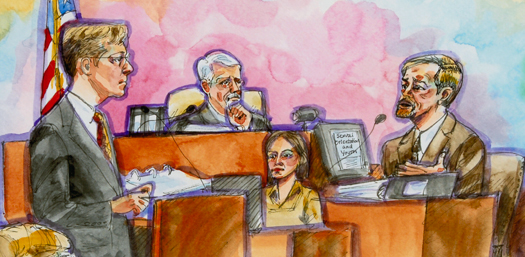Marriage News Blog

On the ninth day of trial, Gregory Herek, a professor of psychology at the University of California, Davis, testified about sexual orientation and social stigma.┬Ā His testimony addressed the psychological and psychiatric understanding of sexual orientation, whether an individualŌĆÖs sexual orientation can be changed, and Proposition 8ŌĆÖs relation to stigma and prejudice.
Professor Herek is the author, editor, or co-editors of several books and articles, including Stigma and Sexual Orientation: Understanding Prejudice against Lesbians, Gay Men and Bisexuals and Out in Force: Sexual Orientation and the Military.
Watch Rory OŌĆÖMalleyŌĆÖs reenactment of Professor HerekŌĆÖs testimony from the Los Angeles premiere of ŌĆ£8ŌĆØ the play.
Testimony Highlights
ŌĆ£[S]exual orientation is at its heart a relational construct, because it is all about a relationship of some sort between one individual and another, and a relationship that is defined by the sex of the two persons involved.”
ŌĆ£[These] sorts of relationships, that need for intimacy, that need for attachment, is a very core part of the human experience, and a very fundamental need that people have.ŌĆØ
ŌĆ£[H]eterosexual and homosexual behaviors alike have been common throughout human history.ŌĆØ
ŌĆ£I’ve conducted research thatŌĆöin which I found that the vast majority of lesbians and gay men, and most bisexuals as well, when asked if they feel that theyŌĆöshow much choice they’ve had been their sexual orientation, about being gay or lesbian or bisexual, say that they have experienced no choice or very little choice about that.ŌĆØ
ŌĆ£It’s my opinion that the current research does not indicate that interventions that are designed for that purpose have been shown to be effective using the criteria that I described this morning.
ŌĆ£It certainly is the case that there have been many people who, most likely because of societal stigma, wanted very much to change their sexual orientation and were not able to do so.ŌĆØ
ŌĆ£Well, the American Psychiatric Association, the American Psychological Association, and other of theŌĆöof the major professional mental health associations, have all gone on record affirming that homosexuality is a normal expression of sexuality, that it is not in any way a form of pathology.ŌĆØ
ŌĆ£[S]exual orientation is really about the relationships that an individual forms. It really defines the universe of people with whom one is going to be able to form the sort of intimate, committed relationship that would be the basis for marriage.ŌĆØ
ŌĆ£[J]ust the fact that weŌĆÖre here today suggests that this is more than just a word ŌĆ” clearly, [there is] a great deal of strong feeling and emotion about the difference between marriage and domestic partnerships.ŌĆØ
ŌĆ£Well, I think that if weŌĆöif we look at, for example, public opinion data, what we see is that there’s a sizable proportion of the public, both in California and in the United States, who say that they are willing to let same-sex couples have domestic partnerships or civil unions or someŌĆösomething that gives them the benefits of marriage without calling it marriage.
ŌĆ£And, yet, they are notŌĆöthey are willing to extend those benefits, but they are not willing to extend marriage to same-sex couples, which suggests that in the minds of a large number ofŌĆöof Americans, there is some distinction between domestic partnerships and marriage; that it’s not simply a word, that there’s more to it than that.
ŌĆ£I think, also, if we look at the recent history of California, when it became possible for same-sex couples to marry, thousands of them did. And many of those who did were domestic partners. So, clearly, they thought there was something different about getting married.
ŌĆ£And I would say that just the fact that we’re here today suggests that this is more than just a word; that there’s, clearly, a great deal of strong feeling and emotion about the difference between marriage and domestic partnerships.ŌĆØ
